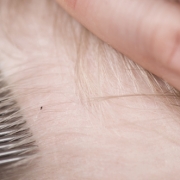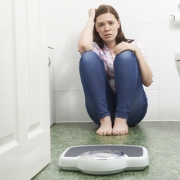When there is a louse in your house
March 7, 2016
Article at a Glance
- Lice are highly contagious and have a reputation for spreading quickly in places like schools and daycare.
- Lice is spread by head-to-head contact and by sharing personal items, not because you are dirty.
- The best way to get rid of lice is by acting quickly and being thorough.
Getting through to your teen about texting and driving
February 29, 2016
- Teen drivers, already a high-risk group, are 23 times more likely to crash when texting.
- Parents can help by talking about the risks, modeling good behavior, defining a teen driving contract and using technological blocks.
Paintball, airsoft, and BB guns less safe than believed
February 22, 2016
Article at a Glance
- Study finds permanent eye injuries—including eye removal—not an uncommon outcome when children play with pellet style guns.
- American Academy of Pediatrics and toy gun manufacturers stress the need for constant supervision and approved eye protection.
- Toy guns can be confused for real guns and should be treated with the same safety rules.
What you need to know about eating disorders
February 15, 2016
Article at a Glance
- Parents should be concerned if their children develop an unhealthy obsession about their weight.
- The most common eating disorders are anorexia, bulimia, and binge eating.
- Eating disorders can be life-threatening and require professional help to overcome.
Building a good relationship with your pediatrician
February 8, 2016
Article at a Glance
- Find a pediatrician who is a good fit with your family and who shares similar views on health issues.
- Staying on top of well-child visits helps your pediatrician monitor your child’s growth and development, keep your child up-to-date on immunizations, and provide advice on any issues.
- To get the most out of your visits, be sure to eliminate distractions, be familiar with your insurance plan, and arrive on time.
Blood Tests: How to prepare your child
February 1, 2016
Article at a Glance
- Be honest with your child, but don’t dwell on the negative.
- Find a time to talk to your child when you can give your undivided attention and there is plenty of time to answer questions.
- Staying calm yourself will help you focus on your child’s needs.
Did you know this about your pharmacist?
January 25, 2016
Article at a Glance
- Your pharmacist is an excellent resource for questions about your prescription and how it might interact with other medications or supplements.
- Make sure you understand and take note of all instructions regarding how to take prescription medication.
- You can call and ask your pharmacist any questions you might have, even after you have filled your prescription and gone home.
Understanding how to make the healthcare system work for your family
January 18, 2016
Article at a Glance
- Get organized ahead of time so that everything is already taken care of in case of an emergency.
- When picking your health insurance, think about what your family’s medical needs are.
- Take the time to find a primary care pediatrician with whom you can develop a long-term relationship of trust.
- Don’t skip well-child visits or immunizations; they are a very important part of your child’s overall health.
Reduce bedtime struggles with the bedtime pass
January 4, 2016
Article at a Glance
- The bedtime pass is a card that allows your child one free trip out of their room or a visit from a parent after bedtime.
- Studies have shown that children who received the passes at bedtime cried out less frequently, settled down faster, and had fewer problems with leaving their bedrooms or having meltdowns.
- Doctors believe that one reason the pass is so successful is that it is acceptable to both parents and children.
What is the difference between a cold and the flu?
December 28, 2015
Article at a Glance
- The flu is much worse than a cold and can potentially be deadly for people with a weakened immune system.
- If your child's illness came on suddenly and symptoms include a high fever, severe exhaustion, headache, loss of appetite, achy muscles, and chills, then it is most likely the flu.
- Don't confuse the stomach flu with the flu - the stomach flu involves the digestive tract and the flu involves the respiratory tract.
Article Types
Archives
Sign up to our Newsletter









